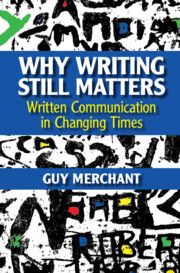Book contents
- Why Writing Still Matters
- Why Writing Still Matters
- Copyright page
- Contents
- Figures
- Preface
- Acknowledgements
- Introduction
- Part I Impressions
- Part II Expressions
- 5 Writing: Power and Regulation
- 6 Writing and Knowing
- 7 Writing Narrative
- 8 Writing, Connecting and Organizing
- 9 Writing Futures
- Conclusion
- Notes
- References
- Index
Conclusion
from Part II - Expressions
Published online by Cambridge University Press: 24 August 2023
- Why Writing Still Matters
- Why Writing Still Matters
- Copyright page
- Contents
- Figures
- Preface
- Acknowledgements
- Introduction
- Part I Impressions
- Part II Expressions
- 5 Writing: Power and Regulation
- 6 Writing and Knowing
- 7 Writing Narrative
- 8 Writing, Connecting and Organizing
- 9 Writing Futures
- Conclusion
- Notes
- References
- Index
Summary
One of the most important things we do with writing is to use it as a means of giving expression to our experience. Through writing, our thoughts, our feelings and our imagination are given material form. They can be shared with others, or returned to at a later date. Not only can we clarify our thinking through writing but we can also use it to build complex arguments, to construct elaborate theories as well as to develop fictional worlds that are enriching, entertaining and help us to understand our world better. And because writing acts as an extension of memory, ideas, themes and descriptions can be aggregated in order to propel a complex argument or develop a sustained narrative, and these can be returned to time and again. Writing also opens up worlds of experience that are both similar and different to the ones we are familiar with and this chapter argues that writing is important simply because building and sharing understanding is so important to us. Our capacity to inform each other, to reflect on what we do and how we act, and to pool what we know is one of the most useful technologies at our disposal.
Keywords
- Type
- Chapter
- Information
- Why Writing Still MattersWritten Communication in Changing Times, pp. 154 - 164Publisher: Cambridge University PressPrint publication year: 2023
- 1
- Cited by

